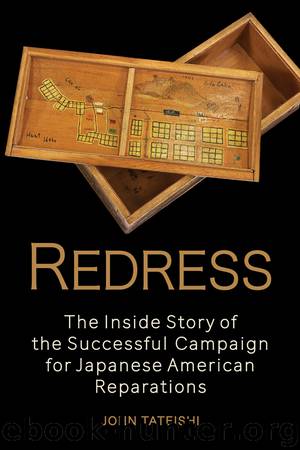Redress by John Tateishi

Author:John Tateishi
Language: eng
Format: epub
Publisher: Heyday
AN AMERICAN TESTIMONIAL
When the JACL national council of delegates voted in 1978 to approve the Salt Lake City Guidelines, in typical fashion it didn’t have adequate funds to back its support of this, its priority program. Redress was given a $12,500 budget for each of two years, which was a substantial amount for a committee budget of the JACL, but that number did not reflect an expectation that redress would evolve into a national campaign. The publication of A Case for Redress under Clifford’s chairmanship absorbed practically all of his committee’s biennial budget in a matter of months, so I knew the committee for redress didn’t have adequate funding to do all I wanted to do—all we needed to do.
The unexpected success of the campaign and its expanded budget demands became the problem of Karl Nobuyuki. As national director, he was responsible for authorizing program expenditures and keeping an already tight budget balanced; lucky for us, he was more than willing to scour the JACL’s budget to support the program, an almost herculean task given the organization’s limited resources. Nobuyuki proposed to Clifford and me that we could generate additional funds by hosting a black-tie tribute dinner to honor all of the Japanese American members of Congress together, something that had never been done before. His idea was to use the balance of funds in my program budget to organize the fundraiser dinner, which he anticipated would generate over $100,000. (For perspective, these were the days when $25,000 could get you a hot Porsche and $100,000 could get you a big house in the hills.)
In addition to Clifford, Karl, and me, the dinner-planning committee included National Board Treasurer George Kodama from Los Angeles, Min Yasui, and Mike Masaoka, who was important in this enterprise because he was probably the one person who could convince all five (including Hayakawa) of the Japanese American members of Congress to participate. Given his long tenure in Washington, D.C., he had a personal relationship with each man and was an old hand at these types of events, not to mention that his participation would generate a large audience of his followers from within the JACL, where he still held tremendous influence.
As much as Mike was revered by many of the old guard in the JACL while at the same time he was reviled by many others in the Japanese American community, his Washington credentials were impressive and, apart from Dan Inouye and Norm Mineta, he probably had more credibility as a political operator than any other Asian American. Mike would be crucial in guiding us through the politics and protocols of attempting something this big.
We were all agreed that the purpose of this dinner would be to honor the Big Four Japanese American members of the United States Congress and that it would be called “An American Testimonial.” The hitch came when Masaoka insisted that Hayakawa had to be included. To exclude him would be an insult, he said (which was precisely the point, as far as I was concerned), and as an organization we should at least honor the office he occupied.
Download
This site does not store any files on its server. We only index and link to content provided by other sites. Please contact the content providers to delete copyright contents if any and email us, we'll remove relevant links or contents immediately.
| African-American Studies | Asian American Studies |
| Disabled | Ethnic Studies |
| Hispanic American Studies | LGBT |
| Minority Studies | Native American Studies |
Cecilia; Or, Memoirs of an Heiress — Volume 1 by Fanny Burney(31332)
Cecilia; Or, Memoirs of an Heiress — Volume 3 by Fanny Burney(30934)
Cecilia; Or, Memoirs of an Heiress — Volume 2 by Fanny Burney(30889)
The Great Music City by Andrea Baker(21313)
We're Going to Need More Wine by Gabrielle Union(18072)
Bombshells: Glamour Girls of a Lifetime by Sullivan Steve(13108)
Pimp by Iceberg Slim(12931)
All the Missing Girls by Megan Miranda(12747)
Fifty Shades Freed by E L James(12451)
Norse Mythology by Gaiman Neil(11883)
Talking to Strangers by Malcolm Gladwell(11876)
Crazy Rich Asians by Kevin Kwan(8349)
Mindhunter: Inside the FBI's Elite Serial Crime Unit by John E. Douglas & Mark Olshaker(7834)
The Lost Art of Listening by Michael P. Nichols(6473)
Enlightenment Now: The Case for Reason, Science, Humanism, and Progress by Steven Pinker(6405)
Bad Blood by John Carreyrou(5769)
The Four Agreements by Don Miguel Ruiz(5511)
Weapons of Math Destruction by Cathy O'Neil(5036)
We Need to Talk by Celeste Headlee(4868)
